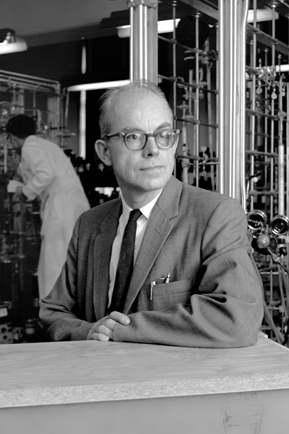A Teacher, Recruiter, and Leader
With a kind, firm hand, Lowell Coulter built a chemistry department

Lowell V. Coulter, a College of Arts & Sciences professor emeritus of chemistry, died early last month. He was 95.
Coulter’s achievements as chairman of the chemistry department seem characteristic of this University’s remarkable progression. As BU began the transition from a commuter college in the 1960s and 1970s to an international research hub, he ensured that his department was on the leading edge of the institution’s growth.
It was no easy feat, former colleagues say. From doubling the size of the chemistry faculty to procuring new space for a growing staff in what was then the College of Business Administration building, Coulter oversaw the department’s expansion with a kind but firm sensibility.
“He knew what needed to be done to develop the department and its programs and make sure that it happened,” says Morton Z. Hoffman, a professor emeritus of chemistry, who worked under Coulter.
A native of Ohio, Coulter earned a bachelor’s degree from Heidelberg College, a master’s from Colorado College, and a doctorate from the University of California, Berkeley, which housed one of the top chemistry departments in the world.
After a brief stint at the University of Idaho, he arrived at BU in 1942. He soon left to spend a year in Dayton, Ohio, where he led the section of the Manhattan Project that developed the atomic bomb’s detonation trigger.
A physical chemist, Coulter returned to the University and led the department from 1961 to 1973. As chairman, he expanded the faculty from 8 members to more than 20. He embraced the new field of biochemistry and hired the University’s first biochemists. He helped introduce honors-level general chemistry for undergraduates to draw in top students.
“Lowell had something to do with recruiting unusually good undergraduates,” says Norman Lichtin, a professor emeritus of chemistry.
Coulter’s own research interests lay in the heat-absorbing properties of clathrates, compound crystals formed from many different molecules. His field has recently come back in vogue; methane, a greenhouse gas, forms clathrates in low-temperature ice, and climate scientists have proposed using the technique to store pollutants.
“He probably sacrificed his own research program to the welfare of the department,” says Lichtin, who succeeded Coulter as chairman.
Coulter retired from teaching in 1977, leaving behind a chemistry program that was very different from the one he had found.
“Today people are doing research and writing papers and getting grant money, but the teaching legacy has not been displaced in any way,” Hoffman says. “Students are still well cared for, well educated in the chemistry department.”
This is Coulter’s legacy, Hoffman concludes: “what has happened since then, through the seeds he planted.”
Comments & Discussion
Boston University moderates comments to facilitate an informed, substantive, civil conversation. Abusive, profane, self-promotional, misleading, incoherent or off-topic comments will be rejected. Moderators are staffed during regular business hours (EST) and can only accept comments written in English. Statistics or facts must include a citation or a link to the citation.